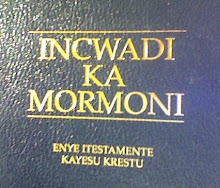Ardis' magnificent essay on testimony.
From a comment by Ardis Parshal at her Keepapitchinin blog. Worthy enough to be linked to, and to duplicate here in case her blog goes away. Ardis is a researcher, genealogist and historian in Salt Lake City, Utah.
... it would help to think of “a testimony” not as a single, solid thing, but as made up of many smaller parts. I know that we usually speak of “a testimony” as something you gain or lose as a whole, but it isn’t. If people really examine what they know — whether it’s in the traditional Mormon religious sense, or what they know about biology or politics or computer science or anything else — they recognize that what they know is a collection of a whole lot of much smaller pieces that coordinate and build up a composite whole.
When that’s the case, finding out that you had a misunderstanding or were flat-out wrong about one detail doesn’t mean that everything else has to come crashing down. I might learn that George Washington didn’t really cut down a cherry tree as a child; no matter how dismayed I might be at the discovery, that doesn’t change the fact that George Washington was married to Martha, or that he was a surveyor, or that he was the first president of the United States, or any of dozens of other things I know about him. My dismay at learning that I believed one thing that was incorrect may make me doubt everything else I know about him until I’ve had time to review the reliability of my sources and put together a new picture of his life that makes sense with the corrected understanding. I’d be wrong to stop believing in his existence as an historical figure at all just because I had to correct one error in my understanding.
I don’t know what your professional field is, but I’ll bet you engage in that kind of adaptation all the time — you realize the illness you are studying isn’t really caused by the virus you suspected, or you miscalculated at the beginning of an elaborate mathematical problem, or the candidate you were promoting has a defect that disqualifies him. Whatever your field is, you go back to the point where your work remains solid, cut out the faulty part, and carry on with your work in the new direction. You don’t quit your job and declare that science is bogus or that the entire democratic system is a failure!
When somebody learns that they had a too rosy image of some part of church history — whether the rosiness was because of a personal misunderstanding or because somebody didn’t tell them the whole or the true story — they’d be foolish to throw out everything, including sound history. As with anything else, you backtrack to solid ground and see what it all looks like after you’ve cut out the misunderstanding or added the new data. Learning that Joseph Smith was a polygamist doesn’t affect the origin of the Book of Mormon; learning about Mountain Meadows doesn’t affect the First Vision. Learning something new or correcting a misunderstanding may cause you to re-evaluate and redefine your understanding of some basic ideas, but a new/corrected idea doesn’t necessarily invalidate everything you previously knew with regard to religious history any more than it does with regard to any other field.
Does this count as “the awareness to recognize nuance,” or were you using that as code for something else? Because if someone has the awareness to recognize their understanding of marriage, life, or a professional field involves growth and adaptation toward a greater understanding rather than divorce, suicide, or abandonment of a career, then they *should* be capable of applying the same recognition to matters of faith and testimony. They *should* be capable of adjusting a faulty part without throwing away the legitimate whole.
Comment by Ardis E. Parshall — November 24, 2010 @ 3:38 pm
Labels: testimony


0 Comments:
Post a Comment
<< Home